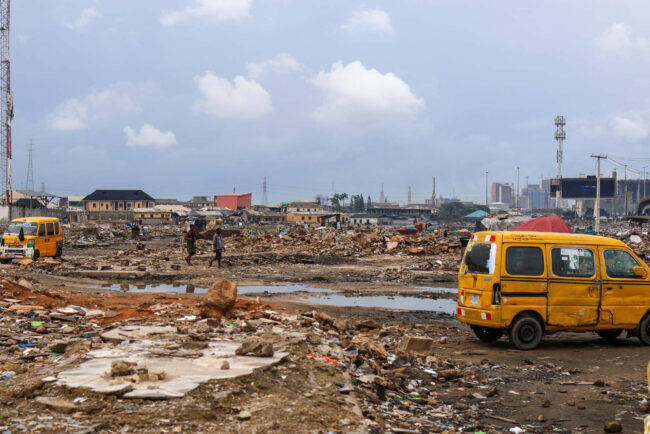A 2017 ruling in a lawsuit filed on behalf of the residents of Ilaje-Otumara and several other informal settlements shows government officials argued they were illegal squatters and that the communities violated environmental laws and were a safety threat.
The High Court of Lagos State found community members didn’t show any evidence they had the right to occupy the land, and that under the law, the land was subject to the management and control of the Lagos state governor.
But the ruling also said it would be unconstitutional to evict community members without adequately notifying them or providing an alternative place to settle. It directed the parties to begin consultations on how to relocate residents and said government officials couldn’t evict them until those talks finished.
More than 13,500 people had occupied about 1,056 wood and concrete structures in Ilaje-Otumara, an area covering around 56 acres in Lagos Mainland, said Jude Ojo, a community leader. He was a plaintiff in the court case and continues to advocate for those displaced.
Ojo said eviction notices had been served in the community before the demolition, but consultations about resettlement were still ongoing when it happened.
Justice & Empowerment Initiatives, a Nigerian nonprofit that represented residents in the lawsuit, issued a statement with other advocates calling the demolition operation a “kamikaze-style mass forced eviction in violation of subsisting court orders.” The group blamed state government officials, police and area boys.
The Office of the United Nations High Commissioner for Human Rights also criticized the early March demolition of Ilaje-Otumara and another local informal settlement, saying Nigeria must halt “a ruthless campaign of home demolitions and forced evictions in waterfront settlements in Lagos.”
The statement called the locations “prime sites for luxury housing development” and said displaced people should get alternative housing and compensation for lost property.
The UN describes informal settlements as communities that form in urban areas that usually lack basic services and city infrastructure, and where housing arrangements range from squatting to informal rentals.

